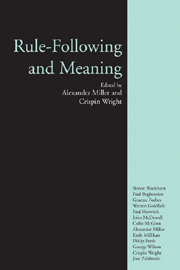Book contents
- Frontmatter
- Contents
- Acknowledgements
- The Contributors
- 1 Introduction
- 2 Skepticism and Semantic Knowledge
- 3 The Individual Strikes Back
- 4 Wittgenstein on Following a Rule
- 5 Wittgenstein, Kripke and Non-Reductionism about Meaning
- 6 Kripke on Wittgenstein on Rules
- 7 Critical Notice of Colin McGinn's Wittgenstein on Meaning
- 8 Meaning and Intention as Judgement Dependent
- 9 The Rule-Following Considerations
- 10 The Reality of Rule-Following
- 11 Truth Rules, Hoverflies, and the Kripke–Wittgenstein Paradox
- 12 Kripke on Wittgenstein on Normativity
- 13 Meaning, Use and Truth
- 14 Kripke's Normativity Argument
- Guide to Further Reading
- Index
7 - Critical Notice of Colin McGinn's Wittgenstein on Meaning
- Frontmatter
- Contents
- Acknowledgements
- The Contributors
- 1 Introduction
- 2 Skepticism and Semantic Knowledge
- 3 The Individual Strikes Back
- 4 Wittgenstein on Following a Rule
- 5 Wittgenstein, Kripke and Non-Reductionism about Meaning
- 6 Kripke on Wittgenstein on Rules
- 7 Critical Notice of Colin McGinn's Wittgenstein on Meaning
- 8 Meaning and Intention as Judgement Dependent
- 9 The Rule-Following Considerations
- 10 The Reality of Rule-Following
- 11 Truth Rules, Hoverflies, and the Kripke–Wittgenstein Paradox
- 12 Kripke on Wittgenstein on Normativity
- 13 Meaning, Use and Truth
- 14 Kripke's Normativity Argument
- Guide to Further Reading
- Index
Summary
Colin McGinn's book belongs to the reaction to, and against Saul Kripke's Wittgenstein on Rules and Private Language. The book is in four chapters. The first and third are respectively devoted to exegesis of Wittgenstein's ideas on rule-following and understanding, and to criticism of them. The second attacks Kripke's famous tandem of Skeptical Argument and Skeptical Solution as an interpretation of Wittgenstein; and the fourth criticizes Kripke's dialectic on its own terms.
McGinn's book is not straightforward to appraise. Certainly, there is much in it to admire, and much with which to agree. One must admire, in particular, – though with one very major qualification to be developed below – the lucid and well-organized presentation of a number of the most fundamental themes concerning meaning and understanding in Wittgenstein's later philosophy; McGinn's first chapter will surely become a standard reference in the reading lists for undergraduate courses on Wittgenstein for some considerable time. And one must agree – though perhaps with more reluctance than McGinn can be credited with – that Kripke does misrepresent, in significant respects, the overall gist of the discussion of rules and rule-following which Wittgenstein's later writings contain. In particular, as commentators on Kripke's book have pointed out almost without exception, Wittgenstein does not accept the paradox – it is another question whether it is the same as Kripke's Skeptical Paradox – with which Investigations §§198–201 are concerned.
Because the view is so widely received that Kripke's book fails as strict exegesis of Wittgenstein, and because there has been so much independent discussion of its Skeptical Argument and Solution, I shall here mainly concentrate on McGinn's own interpretation of Wittgenstein and his criticisms of the views which he finds.
- Type
- Chapter
- Information
- Rule-Following and Meaning , pp. 108 - 128Publisher: Acumen PublishingPrint publication year: 2002



